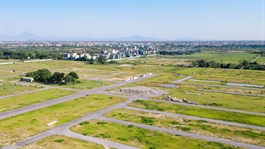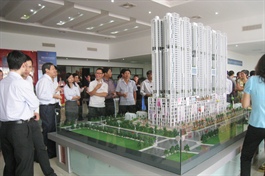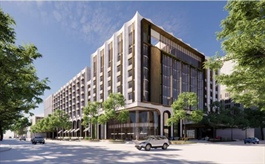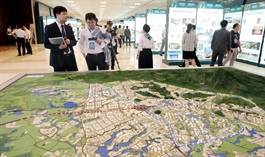Hai Phong encourages sustainable industrial zones development
Hai Phong encourages sustainable industrial zones development
The northern port city of Hai Phong always encourages investors to focus on developing the ecological, sustainable and effective industrial zones (IZs), said Le Trung Kien, Head of Hai Phong Economic Zone Authority (HEZA).

Kien made the statement at Thursday's two-day conference themed "Building the future" held in the city. HEZA and DEEP C Industrial Zones jointly held the event to celebrate the IZ developer's 25 years of development.
Currently, Hai Phong's IZs have invested in environmental protection technical infrastructure works meeting international standards.
The city encourages investors to use renewable energy sources, wind energy, rooftop solar power, and environmental protection production technologies.
Paul Tonkes, Deputy Director of Industrial Real Estate at Kajima Development Co Ltd - a developer of Core5 Vietnam, a platform for developing and operating industrial real estate, said: "The story of attracting foreign investment in Viet Nam is still very strong. Since the COVID-19 outbreak, Viet Nam's industrial real estate market has mainly relied on existing manufacturers in the country because companies cannot freely travel to evaluate investment locations. Now that most countries have opened their borders and lifted restrictions, these pent-up needs are being released."
Bruno Jaspaert, CEO of DEEP C Industrial Zones, said: "After 25 years of presence in Viet Nam, the IZs of DEEP C Industrial Zones Complex have attracted about US$5 billion in investment capital. In the near future, we wish to make a greater contribution to the sustainable development of Hai Phong and Quang Ninh in particular and of Viet Nam in general by building an eco-industrial park which is recognised as meeting standards according to the Government's regulations. We are looking forward that secondary investors will create this future with us."
Bruno added that in the coming period, DEEP C would continue to focus on renewable energy projects, developing industrial symbiosis opportunities in the IZs, and recycling solutions such as building roads from recycled plastic to bring environmental, economic and social benefits to both DEEP C and the community.
Earlier, DEEP C Industrial Zones cooperated with DOW Chemical Company Viet Nam to implement a pilot project to build internal roads from recycled plastic. As a result, the 200-metre road pilot project from recycled plastic was built in September 2019. In addition, DEEP C Industrial Zones is continuing to test the construction of an internal road of Deep C2A from recycled plastic with a length of 1,200 metres.
In 2020, the first solar panel on the roof of the 20,000sq.m factory in DEEP C Hai Phong Industrial Zone was put into operation with a capacity of 3MWp, continuing to attract other companies to sublease the factory's roof. As a result, the installed capacity is expected to increase to more than 20MWp by 2023.
By the end of 2021, wind turbines with a height of up to 100 metres and blades longer than the original version to optimise wind power, supplying 2.3MW of electricity, will be directly connected to the DEEP C's internal grid. As a result, DEEP C expects that half of its electricity demand will be self-sufficient from renewable energy by 2030. At the same time, it would research new technologies to realise the ambition of 100 per cent power autonomy.
Emphasising building a green economy and sustainable development, Economist Tran Dinh Thien said: "To realise the mission of making Hai Phong become a strong growth pole of the country, it is necessary to receive the support and sharing of big investors in the world. Through DEEP C, Hai Phong can access a large market and investors from Europe."
Vadym Sheronov, Managing Director of Royal Haskoning DHV in Viet Nam, said: "More and more businesses see climate change as an important issue for their business operations. Investors seek and choose partners with the same sustainable development standards, environmental protection and labour safety. This helps create a competitive advantage for industrial parks that are oriented to become eco-industrial parks like DEEP C in attracting investors in the high-tech sector."
To welcome this shift, DEEP C currently has about 1,840 hectares of industrial land available for lease.
"However, according to my assessment, the investor's demand for land lease has quickly increased to 2,000 hectares. That means we have to expand quickly to be able to meet their needs," Bruno added.
DEEP C is gradually implementing Environmental, Social and Governance (ESG) standards, which is the core criterion for its sustainable development strategy. DEEP C has been applying the United Nations Sustainable Development Goals.
DEEP C is one of the first five industrial zones selected by the Ministry of Planning and Investment and the United Nations Industrial Development Organisation (UNIDO) to pilot the transformation to an ecological industrial park model towards a circular economy.
And this event, Hai Phong Economic Zone Authority awarded the Investment Certificate to First Global Business Co Ltd for the project of manufacturing film wrapped in photovoltaic panels with a total investment of US$98 million at DEEP C Industrial Zones in Hai Phong.



















